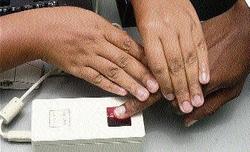
Mcgregor
The impending general elections present an ideal opportunity for us to consider the implications of our decision to vote (or not). Where did the right to vote originate, and why does the decision as to whether to exercise the right or not deserve to be given serious thought?
What is the right to vote?
On the one hand, it is seen as an opportunity to choose the persons whom we want to represent the government of our country. By installing persons to lead us, we decide whether we believe they are capable of safeguarding the individual rights of the citizens of ourcountry and we are able to hold them accountable for their actions.
On the other hand, in a negative context, the operation of the election machinery demonstrates the power of politicians to influence public decisions, and the ability of a few persons to take advantage of the majority to advance their selfish interests.
Do we have a right to vote?
The right to vote is firmly established in most countries, whether by international treaties, legislations or the constitution. In Jamaica, every person who is qualified to be registered as an elector, and is so registered, has the right to participate in free and fair elections based on the Constitution and the Fundamental Rights (Additional Provisions) (Interim) Act 1999.
Why give it careful thought?
There was a time when a woman was unable to vote, to hold land in her name, retain wages she earned or inherit her husband's property upon his death. The property went to the eldest male relative. These and other factors underscored the need for the establishment of women's rights.
Before women had the right to vote, they could not be members of a jury, because anyone whose name is not on a current list of electors is not entitled to be a juror. Therefore, a woman who was charged with a crime before 1944 would have her fate determined by an all-male jury, so she could hardly be said to have been tried by a "jury of her peers".
With universal adult suffrage came the right for all persons to vote in free and fair elections. New Zealand was the first to embrace it in 1893 and Jamaica did the same in 1944. With that change, women were able to vote and stand for political office. It is, therefore, significant that today, 63 years after that right was recognised in Jamaica, and after 12 general elections, we now have female political representatives and a female Prime Minister.
In some countries today, the right of women to vote is still a myth, and in others, the right to vote is yet to translate into a right for women to holdpolitical office.
In our country, we enjoy all of those rights, yet the politics of our nation continues to be a source of discontent; characterised by a reluctance to participate in the process.
If we remind ourselves that many persons fought long and hard to secure the right, but never had the chance to exercise it, perhaps it will inspire those who lightly decide not to participate in the process to give more careful thought to what it truly represents.

Methods of voting have come a long way and many women will be able to vote electronically in select constituences islandwide in the upcoming general election.
Sherry-Ann McGregor is partner and mediator with the firm Nunes, Scholefield, DeLeon & Co. Send feedback and questions to lawsofeve@yahoo.com or Lifestyle@gleanerjm.com.
